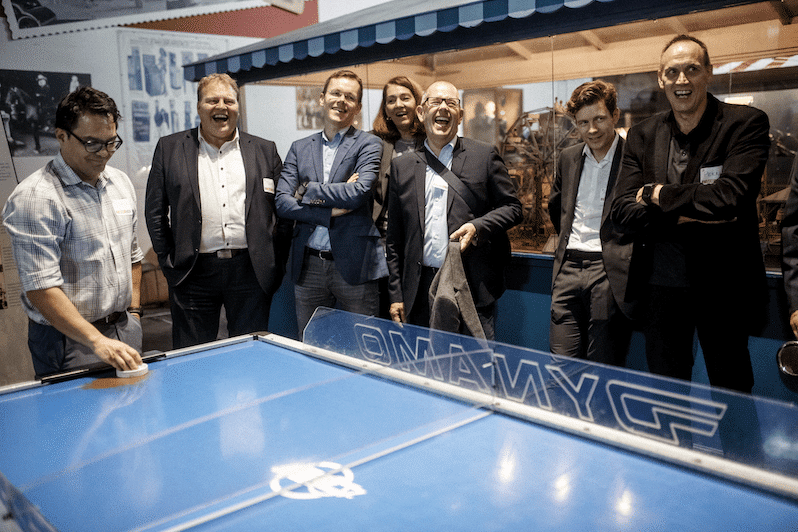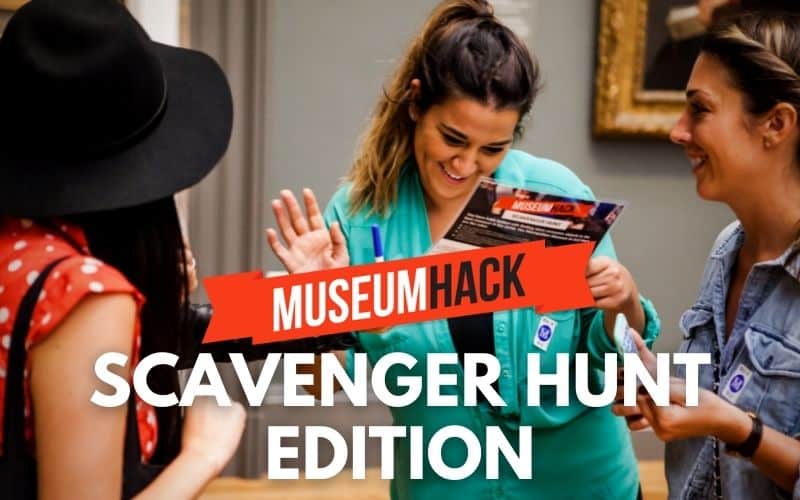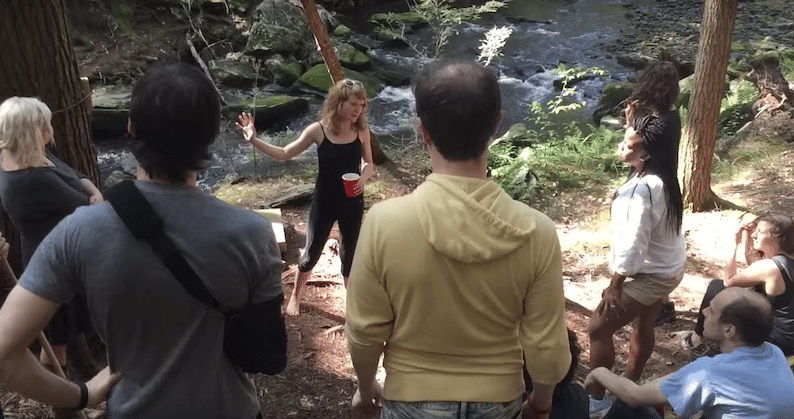You found our guide to company retreat ideas.
Company retreats are multi-day events where staff gather offsite to build skills, network with colleagues, and celebrate company culture. These events are also known as “corporate retreats”, “work retreats”, “team retreats”, “staff retreats”, “employee retreats” and “team building retreats”.
Retreats are a type of team building activity, company offsite, corporate event, and team bonding exercise. These events are held at corporate retreat locations and help improve corporate culture and can boost company morale.
This article explains:
- company retreat ideas for employees
- corporate retreat ideas for staff
- work retreat ideas
- corporate retreat locations
- corporate retreat venues
- one-day company retreat ideas
Let’s get to it!
Company retreat location ideas
Here are venue ideas for where to host team retreats.

1. Cruise
Cruises take much of the heavy-lifting out of the planning process. Because cruise packages tend to include lodging, dining, and entertainment, organizers can choose from pre-existing activities instead of designing an agenda from scratch. Plus, companies may be able to score a special corporate or group rate. One major advantage to this method is that it encourages participants to commit to the full retreat, as opposed to leaving early for work appointments or personal matters.
We recommend booking your cruise via CruiseSheet, which always shows the full-rate of your booking upfront.
2. Cabin or Glampground
Camping is a popular choice for retreats, yet only a select portion of the workforce is willing and able to truly rough it. Renting cabins or glampgrounds provides a more upscale alternative to pitching a tent. Employees still get to enjoy the great outdoors, yet from shelters that block out the elements and have basic amenities. These conditions give participants a baseline of comfort so that they can fully be present and participate in daytime activities, instead of tending to mosquito bites or backs put-out by sleeping on the hard ground.
Want some free team building tools?
$49 value (100% free)
- 100+ fully tested icebreaker questions
- 24+ themed Bingo generators
- 5+ PDFs (including the 8% Rule)
- 2024 team building calendar
- and more...

Enter your email for instant access
3. Resort
Resorts are one of the most obvious company retreat locations. These venues tend to be more all-inclusive and group-friendly than traditional hotels. At minimum, these spaces offer lodging, food, scenic views, and a sense of separation from the outside world. Many facilities have social and entertainment staff that can facilitate activities for teams. Also, most resorts have options for mass bookings and corporate events, especially in the off-tourist seasons. These spaces are intended to provide everything one might need for a vacation, and thus help teams eliminate outside interruptions and distractions.
4. Casino
Casinos are another exciting location idea for company retreats. Many casinos are all-inclusive resorts that include hotel rooms, restaurants, conference spaces, and high-end entertainment. These venues are spacious and able to accommodate large groups, and the glitzy decor can add a dash of glamor and flash to the event. Employees can blow-off steam in off-hours by trying their luck at games. Even non-gamblers can have fun, however, by enjoying amenities such as steakhouses, shows, or shopping.
5. Coworking Office
For more work-intensive and training-based retreats, coworking spaces are an option. These venues consist of rentable office space where individuals or groups can come to work and network. Most coworking spaces offer day or weekend passes, and many also accommodate company events or host their own professional events. Larger coworking offices are great locations for industry retreats, and can make networking easier.
Here is a guide to coworking.
6. Conference Center
Conference centers were built to handle company retreats. These spaces offer a professional atmosphere for conducting large-scale company or industry events. There are typically a variety of different room types such as meeting rooms, lecture halls, theaters, ballrooms, and banquet rooms, as well as different types of event equipment. Some conference centers have accommodations on-site while others have relationships with hotels and restaurants in the area. Whatever the setup, these spaces are geared towards large events and versatile enough to meet a range of needs.
7. Major City
Meeting up in a major city is a go-to choice for many team retreat planners. Big cities offer much in the way of culture, entertainment, business centers, and transportation options. Hubs like LA, NYC, Chicago, and Miami are popular choices for corporate retreats, yet smaller cities also have potential for adventure and excitement. Many organizations opt to rotate the retreat location between cities in which there is a company office. However, choosing a random city means that employees can experience the destination fresh together and bond by exploring.
For help coordinating out-of-town events, here is a list of top destination management companies.
8. Abroad
They say “go big or go home,” and moving the company retreat overseas is one of the best ways to go big. Hosting a retreat abroad is a good option for companies who operate internationally or have a globally dispersed workforce. These events entice travel-loving workers and give employees an opportunity to experience a different culture. Plus, travel can help break folks out of their shells and comfort zones and encourage growth and healthy risk-taking.
For inspiration, here is a guide to corporate travel incentive programs.
9. Online
Meeting in person is not always possible. Even if your team cannot travel or gather to one central location, you can still hold a fun and engaging retreat. Remote retreats give teammates the opportunity to come together, learn, receive updates, align in terms of company goals and direction, and mingle with coworkers. Activities might include all-hands announcements, Zoom happy hours, online awards ceremonies, and webinars.
For more ideas, here is a guide to hosting virtual team retreats, and a list of virtual event platforms.
Corporate retreat ideas & activities
1. Ropes Courses
Ropes courses are adventure venues where teams must work together to complete physical challenges. Examples of course challenges might include rope bridges teams must cross or seesaws teams must balance on. These venues inspire teamwork and cooperation and can help groups fine-tune their communication skills. Plus, these games allow employees to enjoy fresh air and sunshine while having fun.
Check out more outdoor team building ideas.
2. Icebreaker Hours
Retreats give teammates the opportunity to meet and connect with coworkers. However, without structured social activities, employees may stick to their usual cliques. Icebreaker hours are speed networking events where team members participate in a series of quick get-to-know-you activities. For example, participants may have to find teammates with matching stickers and have a chat, then line up to answer icebreaker questions speed-dating-style, followed by a round of mingle bingo, and end with a birthday lineup. These activities introduce employees to a variety of different coworkers and can help attendees overcome initial shyness. Icebreaker hours are best done at the beginning of retreats so that employees can reconnect over the course of the event.
Here is a list of icebreaker questions for teams, and here is a list of large group icebreaker activities.
3. Make Your Own Goodie Bags
Promo presents are one of the perks of company events. Most corporate retreat participants head home with a swag bag full of branded goodies. One fun twist on this tradition is to allow attendees to make up their own swag bags. Simply set up a swag alley where guests can browse tables full of company and vendor promotional items, and give each “shopper” a tote to fill with loot. This activity gives attendees the thrill of getting to choose their own souvenirs and can help to ensure those items actually go to use.
Here is a list of swag items employees love.
4. Museum Hack Scavenger Hunts (Hosted)

During Museum Hack Scavenger Hunts, your team can go on an exhilarating adventure through one of six renowned museums. Our talented hosts will lead your team through the museum, unraveling puzzles and capturing unforgettable photos.
During this 90-minute experience, you can expect:
- a knowledgeable host who will share instructions and stories
- captivating tales about the fascinating world of art and culture
- trivia and photo challenges that encourage interaction with the artwork
- activities that offer unique perspectives on art and artifacts
In addition, the cost of the experience covers museum entry. During this captivating scavenger hunt, discover a whole new way to explore and appreciate culture!
Learn more about Museum Hack Scavenger Hunt.
5. Trivia
Trivia is one of the easiest and most fun games for company retreats. To play the game, first prepare questions and categories, the more eclectic, the better. Then, have attendees form teams, choose names, and compete for bragging rights and prizes. You can use apps like Kahoot! to facilitate the game, have team reporters right down answers, or ask groups to buzz in for the chance to answer first. You can even hold an ongoing trivia tournament if the retreat is longer than one day.
Here is a starter list of trivia questions for teams.
6. Talent Shows
Talent shows give the stars on your staff the chance to shine. Team members can prepare an act and dazzle coworkers with their special abilities. For example, playing the cello, delivering a standup comedy routine, or juggling. These activities can help team members get to know each other and appreciate each others’ skills, plus these shows are a way to provide low-cost entertainment at the retreat. Participants can go solo or recruit colleagues for a group number, and staff with stage fright can cheer on coworkers from the audience.
Here is a guide to doing talent shows virtually.
7. Game Show Extravaganza
Game shows are one of the most exciting and interactive activities for corporate retreats. To run a company game show, first pick your game, then recruit a host, and set up your set. For best results, use visuals and music and get a screen to display your game board and scoreboard. Players can form teams and compete for real prizes. You can make your questions and categories company specific, or leave the content more fun and irreverent.
Here is a list of virtual game show ideas and a guide to team Jeopardy.
8. Instant Friends ID Badges
To make it easier for retreat attendees to network and keep in touch post-event, you can design ID tags for optimal friending. During event registration, ask attendees to opt in to share social profiles such as LinkedIn pages or Instagram handles. Then, print a QR code that links to the page on the attendees’ ID badge. Coworkers can scan the code to friend each other online instantly.
If this approach sounds like too much work, then you could alternately splurge and give each attendee a DOT digital business card that will automatically link to the profiles of choice. This gift can double as employees’ personal business card and can be used when meeting potential clients as well.
9. Movie Nights
Movie nights are one of the simplest team retreat activities. At minimum, you will need a good-sized room, a screen and projector or large TV, and a movie. Upgrades to the experience include hor d’oeuvres and popcorn and candy bars, bean bag chairs and other comfy seating, and sneak peaks of yet-to-be-released films. One fun option is to coordinate an outdoor screening while teammates picnic and stargaze, however having a basic film hangout makes for a rainy day or low-key inside activity as well.
Check out more indoor team building ideas, and look at this list of team building movies.
10. Mix n’ Mingle (Popular)

Corporate retreats are often the only time many team members get to interact with company executives. To take full advantage of this opportunity, you can plan structured time for executives to spend with employees. For instance, you can book the dynamic Mix n’ Mingle experience!
Key features of Mix n’ Mingle include:
- a 90-minute session led by a talented host
- thoughtfully curated icebreakers that spark conversations
- innovative exercises that promote strong bonds
- collaborative group challenges and discussions that encourage teamwork
To simplify your planning process, we will bring all the necessary materials directly to your chosen venue. If you are looking for an environment that strengthens relationships, then explore the exciting possibilities of Mix n’ Mingle!
Learn more about Mix n’ Mingle.
How to do a company team building retreat for staff

1. Consult management
Corporate retreats are major endeavors. You cannot uproot an entire organization, or even a department or team, without first consulting upper management. Before suggesting a retreat to the C-suite, you should research and prepare a proposal.
If the retreat is your recommendation, then you can communicate the benefits of team building retreats to persuade management. You probably want to conduct preliminary research on venues and vendors to present an accurate budget and overview of activities.
If senior management suggested the retreat and entrusted you to organize the details, then you should ask your supervisors about aims for the event. You want to ensure that your efforts align with executives’ vision so that you achieve the expected end result.
Regardless of whether or not upper management initially requested the event, you should involve your leadership in the programming. Retreats are often the only chance afforded to senior leaders to address the company directly, and many leaders are eager to speak, facilitate activities, or at least oversee planning. During the early preparation stages, you should gage how hands-on your leadership prefers to be in the process.
2. Leave plenty of time to plan
Rome was not built in a day, and effective team building retreats do not materialize in a matter of weeks. Team retreats are a massive undertaking, and you need to budget several months of preparation time to ensure your event’s success. The time needed to organize a retreat depends on the size of your organization, the length of the event, and the number of desired activities.
Optimally, you will begin planning your retreat one year ahead of time, but you should not try to cobble together an event of this scale less than six months beforehand.
3. Contact venues
One of the perks of proactive company retreat planning is that time gives you options. Many resorts and event venues offer discounted rates during slower seasons, so flexibility in your calendar can save major money.
Most corporate event friendly venues offer packages for organizations. Be sure to ask about the business’s corporate event packages. Some resorts and conference centers provide all-inclusive packages that include entertainment and team building exercises. Feel free to ask about your options. You may be able to negotiate a more reasonable rate or customize the experience with added extras like guided tours or spa services.
4. Invite speakers and other entertainers
Speakers are a staple of company retreats. In fact, some motivational speakers make a living solely from the corporate event circuit. As a result, these speakers polish the message to resonate with teams like yours. These professionals craft talks on teamwork topics such as stress management and effective communication, distilling complex information into an engaging and easy-to digest presentation.
While attending professional conferences, you can keep your eye out for exciting speakers or ask other attendees for suggestions on lecturers to invite to your event. Plenty of websites can help you find keynote speakers. Feel free to recruit presenters from the workforce too. Some of the most memorable speakers from my past company’s annual conferences were our own organizational leaders.
When selecting lecturers, be sure that the message aligns with your event’s goals as well as your employees’ responsibilities. If you want to invite a more specialized speaker to outline subjects such as sales tactics or provider procedures, you probably want to usher the relevant audience into a breakout session instead of subjecting the whole organization to department-specific information.
You can book entertainers as well as educators for your event. Beyonce may be beyond your budget, but you can invite acts such as comedians, dueling piano players, or performative painters to dazzle your attendees during downtime.
Here is a list of virtual keynote speakers, many of whom also do in-person appearances.
5. Logistics
Managing logistics is either the most fulfilling or most daunting task of planning a large-scale event depending on which personality type you ask. While the venue is likely to handle aspects such as meals, entertainment, and accommodations, you must account for many other details including transportation, collection of employee data, and adjusted operations.
Transportation: Decide whether you will arrange group transportation or reimburse for individual arrangements. If the former, then you may want to contract with a corporate travel company. If the latter, be sure to supply clear directions and arrival times for employees.
Operations/Time Off: Business does not automatically stop while half or all of your employees escape to your event. You will need to make a game plan for how to handle adjusted operations during your company retreat. Perhaps you want to choose the slowest week of the year and shut down completely for a few days. If this is not an option, then you might want to split the event into two sessions so that only half of your employees attend at a time. No matter what, you do not want to abandon clients without notice, so you probably want to hatch a communication or contingency plan.
Personal information: You may need to gather personal information from employees to arrange transportation, reserve hotel rooms, or accommodate special diet requests. The easiest method of such large-scale information gathering is to create a form with a program like Google Forms or SurveyMonkey.
Props and materials: The great team building activities you planned probably require materials. In order to ensure you do not need to make last minute runs to Walmart or the hotel gift shop, you will need to make a list of your supplies, as well as a plan for how to transport those supplies to and from the event.
If you attend to these prior details before your event you can avoid unexpected charges and lessen stress during the event.
Here is a list of event management platforms that can help with logistics and planning.
6. Leave room for fun
Your employees need off-time to recharge and refocus. You should dedicate time to relaxation and recreation in between business sessions. This time allows employees to mingle and connect organically with coworkers.
Suggestions:
- Unstructured free time
- Karaoke
- Cocktail party
- Dance party
- Adventure sports
- Outdoor movie
- Interactive games
- Coffee hour
Just like overstuffing a vacation itinerary can lead to frustration and arguments, overbooking a team retreat can lead to overstimulation of rejuvenation. Employees attend team building retreats to learn and grow, but also to unwind, so give your teammates breaks to avoid burnout.
Final Thoughts
Modern life can be hectic, and even employees in the same office can struggle to connect. Company retreats provide an opportunity for teammates to gather and practice company culture in a fun and engaging atmosphere. Though organizing and executing these events requires coordination and effort, team retreat benefits include increased employee morale and improved interpersonal relationships.
Next, check out this list of out-of-the-ordinary team meeting ideas and these executive retreat ideas.
We also have a list of the best group activities for retreats.

